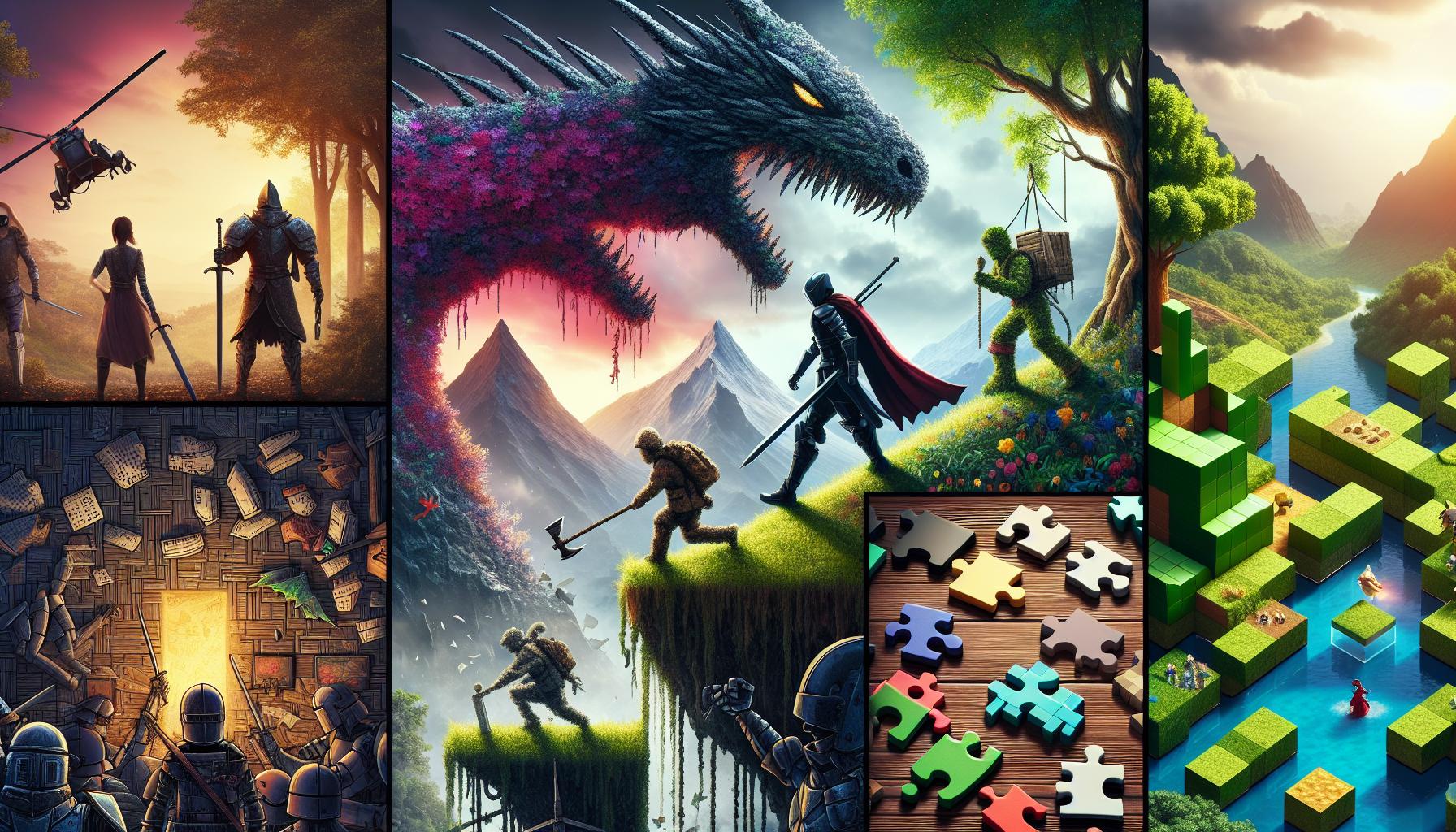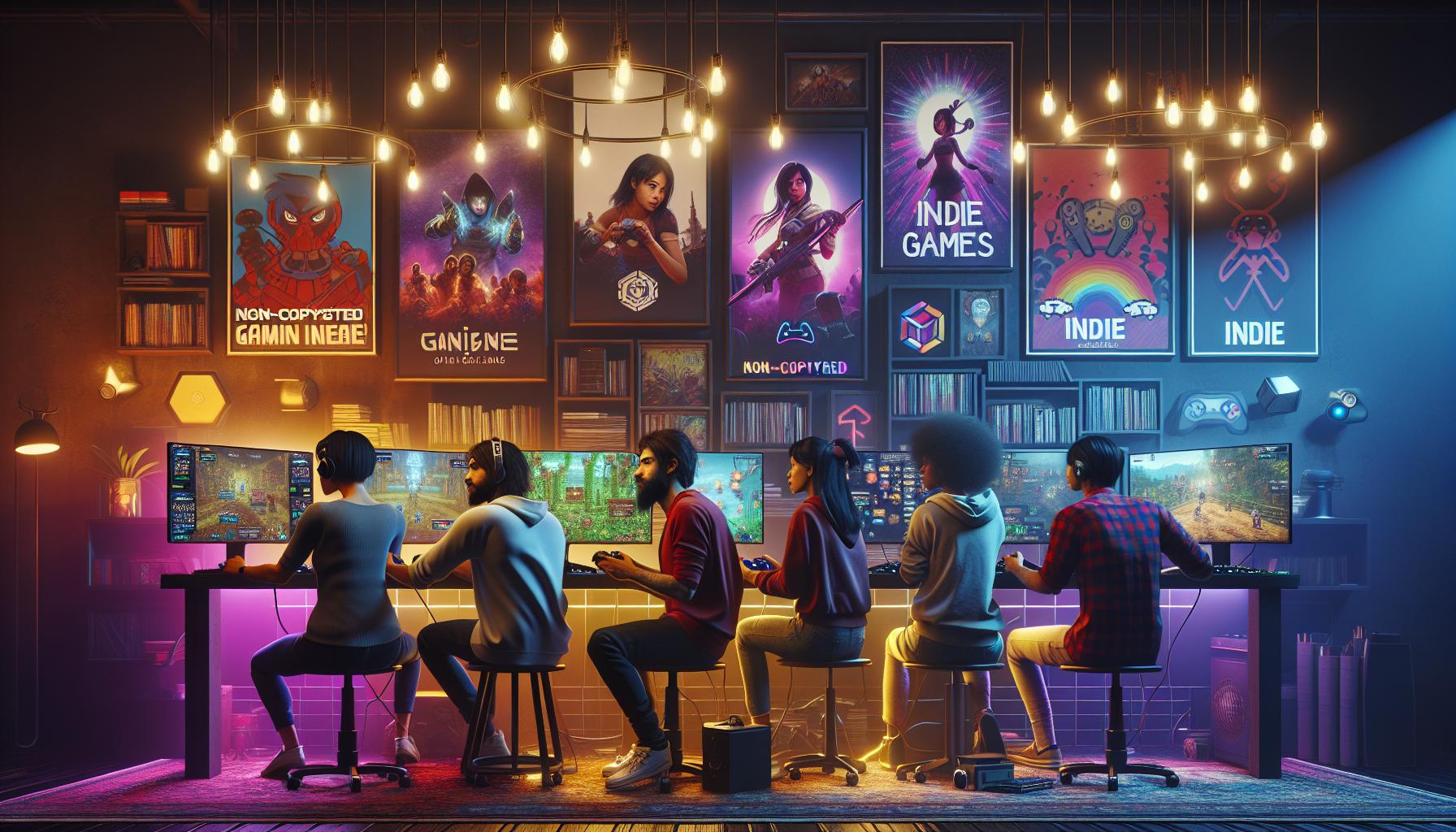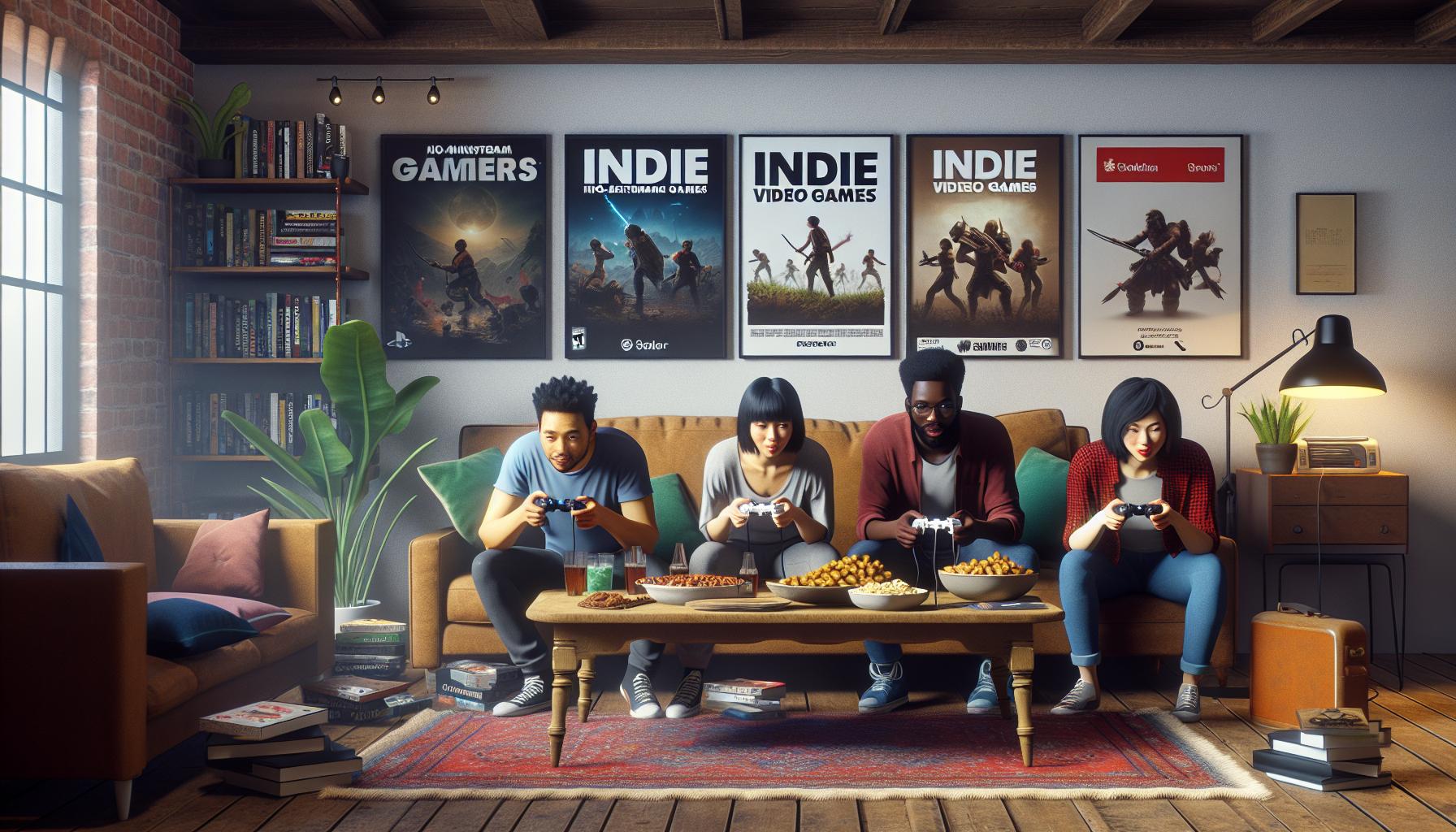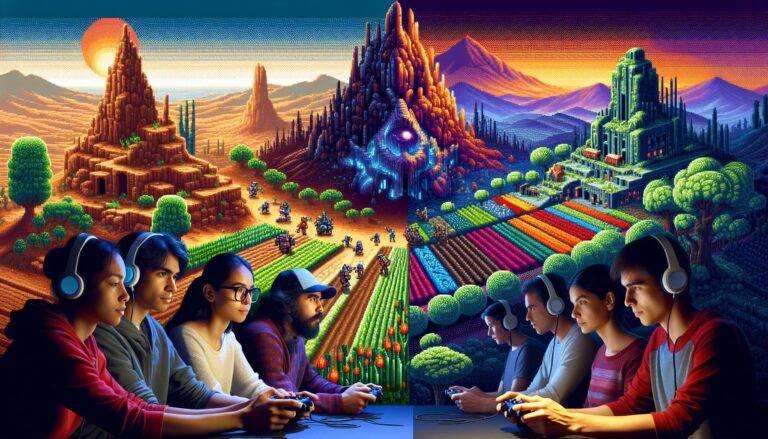Indie games have taken the gaming world by storm, captivating players with their creativity and unique storytelling. As a gamer, I’ve always been drawn to these hidden gems that often deliver experiences far beyond their budget. From innovative mechanics to compelling narratives, the best-selling indie games showcase the talent and passion of independent developers who dare to think outside the box.
In this article, I’ll explore some of the top-selling indie titles that have not only made a mark on the charts but also in the hearts of gamers. Whether you’re a seasoned player or just curious about the indie scene, these games offer something special that’s worth diving into. Let’s uncover the magic behind these remarkable creations and see what makes them stand out in a crowded marketplace.
Key Takeaways
- Indie Games Popularity: Indie games like Hollow Knight, Stardew Valley, and Celeste have gained immense popularity due to their creativity, storytelling, and unique gameplay mechanics.
- Sales Success: Significant sales figures reflect the commercial appeal of indie titles, with Stardew Valley leading at over 20 million copies sold, followed by Hollow Knight with over 3 million.
- Impact on Gaming Norms: Indie developers challenge traditional gaming conventions, inspiring larger studios to innovate and encouraging players to engage with authentic, passion-driven content.
- Diverse Genres: Indie titles span various genres, including action, adventure, puzzle, and strategy, enhancing their accessibility and appeal to different player preferences.
- Community Engagement: Successful indie games foster strong community connections through player interactions during the development process, creating a loyal player base and enhancing game longevity.
- Revolutionizing Success Metrics: Indie games redefine success by prioritizing artistic expression and player experience over mere sales, contributing to a diverse gaming market.
Overview Of Best Selling Indie Games
Indie games stand out for their innovation and diverse storytelling. Many top-selling titles have captured gamers’ attention, showcasing unique gameplay mechanics and emotional narratives. Titles like Hollow Knight, Stardew Valley, and Celeste demonstrate the potential of indie development.
Notable Best Sellers
| Game Title | Release Year | Sales Figures | Key Features |
|---|---|---|---|
| Hollow Knight | 2017 | Over 3 million copies | Intricate world design, atmospheric art |
| Stardew Valley | 2016 | Over 20 million copies | Farming simulation, engaging pixel art |
| Celeste | 2018 | Over 1 million copies | Tough platforming, heartfelt story |
| Hades | 2020 | Over 1 million copies | Roguelike elements, rich narrative backdrop |
Impact on the Gaming Community
Indie games challenge traditional gaming norms. Their successes often inspire larger studios to adopt innovative approaches. Players appreciate the authenticity and passion behind these games, in contrast to the formulaic models that dominate mainstream titles.
Conclusion on Their Significance
The unique qualities of best-selling indie games reveal a deeper connection to the gaming community. Gamers value artistic expression and immersive environments that resonate beyond entertainment. By supporting these titles, players contribute to a thriving alternative in the gaming industry.
Popular Genres In Indie Games


Indie games feature a variety of genres that appeal to different types of gamers. Below are two prominent genres that showcase the creativity and innovation found in indie titles.
Action and Adventure
Action and adventure genres thrive in indie games, often blending fast-paced gameplay with captivating storylines. Titles like Hollow Knight integrate exploration with combat mechanics, immersing players in rich, hand-drawn worlds. Unique gameplay elements, such as skill-based combat and environmental puzzles, push players to think strategically while navigating challenges. Games like Hades elevate this genre through their roguelike elements, offering intense action and replayability. These games frequently emphasize player choice and character development, contributing to a dynamic gaming experience.
Puzzle and Strategy
Puzzle and strategy indie games focus on mental challenges and tactical gameplay. Celeste exemplifies this genre with its platforming mechanics and intricate level design that requires precision and planning. Indie titles often incorporate unique mechanics that differentiate them from mainstream offerings. Games like Return of the Obra Dinn showcase innovative storytelling methods using deduction and problem-solving, creating compelling narratives through gameplay. These genres encourage critical thinking, allowing players to engage deeply with mechanics and storylines while providing satisfying challenges.
Impact Of Indie Games On The Gaming Industry


Indie games significantly shape the gaming industry. They challenge traditional norms while pushing creative boundaries. Many players engage with stories in ways major studios often overlook.
Indie developers bring fresh ideas to the forefront. They experiment with gameplay mechanics and visual styles, resulting in a variety of unique experiences. For instance, titles like Hollow Knight and Celeste offer distinct aesthetics and narratives that large studios seldom replicate.
Indie success stories inspire other developers. A bestselling indie title can lead to increased funding opportunities for up-and-coming creators. Successes like Stardew Valley demonstrate that passion projects can garner commercial acclaim, motivating others to pursue their visions.
In addition, indie games foster community engagement. Developers frequently involve players during the development process through early access and feedback. This interaction cultivates loyalty and enhances player investment, creating shared ownership of the game.
Finally, indie games redefine success beyond sales. Many prioritize player experience and artistic expression over profit, reshaping industry standards. This shift encourages a diverse market that embraces a range of gaming experiences, ultimately benefiting players.
Criteria For Best Selling Indie Games


Evaluating the best-selling indie games involves examining essential criteria that highlight their success and impact. Two significant factors are sales figures and community reception.
Sales Figures
Sales figures reflect a game’s commercial success and popularity. I focus on total units sold and revenue generated to gauge a game’s market performance. For instance, Stardew Valley has sold over 20 million copies, illustrating its widespread appeal. Similarly, Hollow Knight boasts sales exceeding 3 million copies. Sales revenue provides measurable proof of consumer interest, offering insights into what resonates with gamers. Tracking these figures over time reveals trends and shifts in player preferences within the indie gaming landscape.
Community Reception
Community reception encompasses player reviews, ratings, and the overall enthusiasm within the gaming community. It indicates how well a game connects with its audience. I consider platforms like Steam and Metacritic to analyze user ratings and critical reviews. Games like Celeste maintain high scores, with players praising their engaging gameplay and emotional narratives. Positive reception often translates into strong word-of-mouth promotion, which can significantly boost sales. Furthermore, community engagement through events and online forums fosters a sense of belonging, enhancing a game’s longevity and impact in the indie gaming scene.
Notable Best Selling Indie Games
Several indie games stand out for their impressive sales figures and lasting impact on the gaming community. Below, I detail notable titles that have captured the hearts of players around the world.
Hollow Knight
Hollow Knight, developed by Team Cherry, showcases a beautifully hand-drawn world filled with challenging gameplay and intricate lore. Since its release in 2017, it sold over 3 million copies, praised for its fluid combat mechanics and deep exploration elements. Players engage with a vast interconnected map while uncovering the mysteries of Hallownest. The game’s cultural impact extends beyond sales, inspiring a dedicated fanbase and influencing other titles within the metroidvania genre.
Stardew Valley
Stardew Valley, created by ConcernedApe, revolutionized the farming simulation genre, selling over 20 million copies since its launch in 2016. Players create and manage their own farm, build relationships with villagers, and explore a charming world. The game’s accessibility and depth contribute to its widespread appeal, attracting both casual and dedicated gamers. Stardew Valley’s success illustrates how indie games can transform established genres while providing meaningful player experiences.
Celeste
Celeste, developed by Maddy Makes Games, offers more than just a platforming challenge; it tackles profound themes of mental health and perseverance. Released in 2018, it has received critical acclaim, earning a spot among the best indie games, with impressive sales numbers surpassing 1 million copies. Players navigate through challenging levels while experiencing the touching narrative of Madeline’s journey to the top of Celeste Mountain. The game’s emphasis on player community interaction and sharing personal stories enhances its emotional impact, contributing to its legacy within the indie gaming scene.
Conclusion
The world of indie games continues to amaze me with its creativity and passion. Each title I’ve explored offers something unique that resonates deeply with players. From emotional narratives to innovative gameplay mechanics, these games have a way of leaving a lasting impression.
As indie developers push boundaries and challenge norms, they inspire a new generation of gamers and creators alike. The success of titles like Hollow Knight and Stardew Valley proves that great storytelling and gameplay can shine through any budget.
I’m excited to see how the indie scene evolves and what fresh experiences await us. The future is bright for indie games, and I can’t wait to dive into the next wave of captivating adventures.





